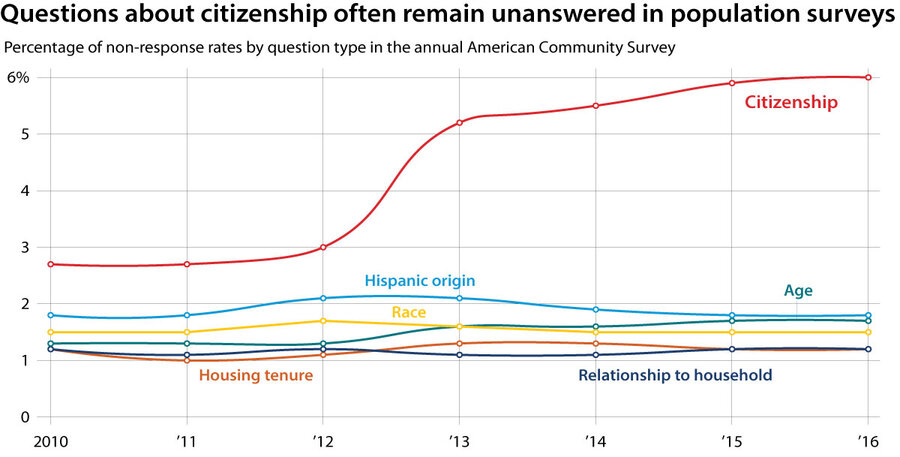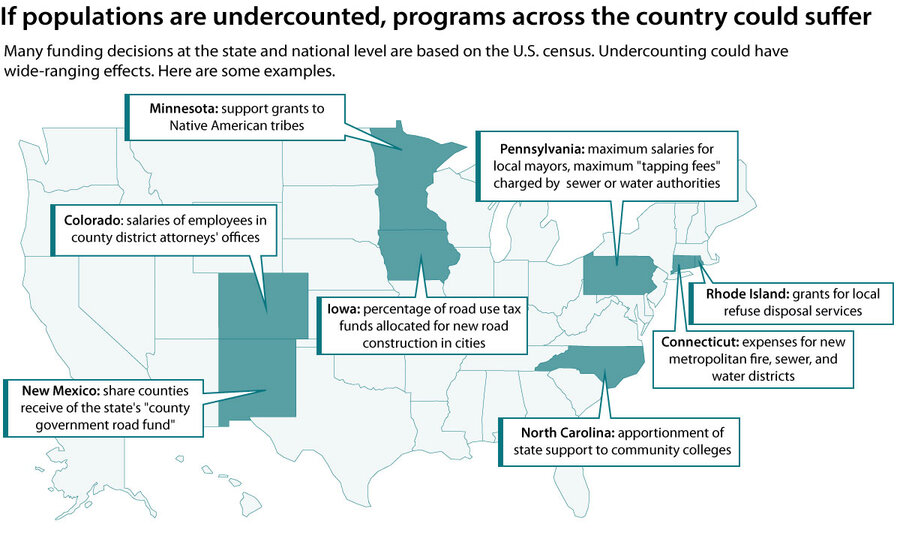Should the census ask about citizenship? Supreme Court to weigh in.
Loading...
Last year, Commerce Secretary Wilbur Ross announced he would reinstate a citizenship question for the 2020 census. The U.S. Census Bureau, a nonpartisan agency, has not asked the question on the decennial census since 1950. But Mr. Ross indicated he was reinstating it after the Department of Justice said it needed “a reliable calculation of the citizen voting-age population” to better enforce the Voting Rights Act.
Several states and nonprofit groups have challenged the move and federal judges in New York, Maryland, and California have ruled in favor of those challengers. The U.S. Supreme Court will hear the case on April 23.
Why We Wrote This
As tensions simmer about the border, the U.S. commerce secretary wants to get a better handle on the number of noncitizen immigrants in the country with the 2020 census. But is the query constitutional?
A striking feature of this case is that Mr. Ross decided to reinstate a citizenship question despite the Census Bureau itself recommending otherwise. Research by the bureau found that the question would decrease responses from noncitizen households by at least 5.8%, leading to an undercount of approximately 6.5 million people – about the population of Tennessee.
Although the potential consequences of having a citizenship question in the 2020 census will be a factor, ultimately the justices will be focusing on broader questions about the power of executive branch agencies and whether adding the question is constitutional.
On April 23, the high court will weigh whether Commerce Secretary Wilbur Ross acted lawfully in deciding to reinstate a citizenship question in the census.
How did we get here?
Required by the Constitution, an “enumeration” of all people living in the United States has been performed every 10 years since 1790. The data is used to calibrate most social and economic surveys in the U.S., and to determine everything from the amounts of federal funding for states to representation in Congress.
Why We Wrote This
As tensions simmer about the border, the U.S. commerce secretary wants to get a better handle on the number of noncitizen immigrants in the country with the 2020 census. But is the query constitutional?
Last year, Commerce Secretary Wilbur Ross announced he would reinstate a citizenship question for the 2020 census. The U.S. Census Bureau, a nonpartisan agency, has not asked the question on the decennial census since 1950 (though it has asked a small subset of the population in the annual American Community Survey). But Mr. Ross indicated he was reinstating it after the Department of Justice said it needed “a reliable calculation of the citizen voting-age population” to better enforce the Voting Rights Act.
Several states and nonprofit groups filed lawsuits challenging the move, and in mid-January a 277-page opinion from a federal judge in New York ruled that Mr. Ross had violated the Administrative Procedure Act (APA), in part by using a pretextual reason for reinstating the question. Then, in early March a federal judge in California ruled that a citizenship question was also unconstitutional. A federal judge in Maryland found the same in early April.
The Supreme Court had been set to hear a case on the citizenship question in February – regarding whether Mr. Ross could be deposed – but it was removed from the calendar after the ruling in New York. A month later, however, the case was put back on the docket. Now the justices will be deciding whether the lower court judges erred in their rulings, whether the decision to add a citizenship question is constitutional, and whether this question will be in next year’s census.
How would a citizenship question affect the census?
A striking feature of this case is that Mr. Ross decided to reinstate a citizenship question despite the Census Bureau itself recommending otherwise. Research by the bureau found that the question would decrease responses from noncitizen households by at least 5.8%, leading to an undercount of approximately 6.5 million people – about the population of Tennessee.
An undercount of that size could mean that a half-dozen states, including California, Texas, and Florida, would lose congressional seats and Electoral College votes. Also, it would jeopardize hundreds of billions of dollars in federal funding to states for services that are used by all, such as health care and infrastructure.
“I think people have misunderstood the likely impact,” says Justin Levitt, a professor at Loyola Law School in Los Angeles. “Immigrant and minority communities [will be affected], but so will everyone around them.”
What is the Supreme Court interested in?
Although the potential consequences of having a citizenship question in the 2020 census will be a factor, ultimately the justices will be focusing on broader questions about constitutionality and the power of executive branch agencies.
Last fall, when the court issued an order halting Mr. Ross’ deposition, Justice Neil Gorsuch wrote in a partial dissent that the entire trial in New York should be halted. “There’s nothing unusual about a new Cabinet secretary coming to office inclined to favor a different policy direction,” he added.
But the trial did go ahead, with a supplemental memorandum in which Mr. Ross acknowledged that “[s]oon after [his] appointment as Secretary of Commerce,” he had begun considering “whether to reinstate a citizenship question.”
This, among other actions, amounted to “a veritable smorgasbord of classic, clear-cut APA violations,” the federal judge in New York ruled.
The court has typically been forgiving of agencies changing policies as long as they do their homework first, Professor Levitt says.
“This might be one of the rare instances where the court says the legal standards are very low,” he adds, but “the Commerce Department tripped over that low bar.”
Where does the 2020 census stand?
The Supreme Court case was fast-tracked to meet a June deadline to finalize the census form. The questionnaires will be printed this summer, and the official start of the census is set for Jan. 21 in Toksook Bay, Alaska.
Most households will be able to begin participating in mid-March, and all will have the opportunity to submit responses online.










